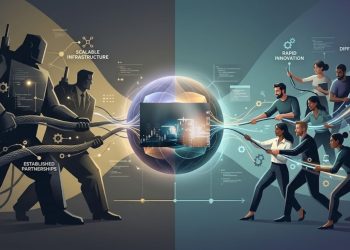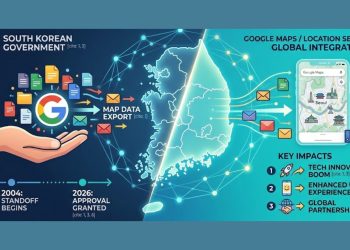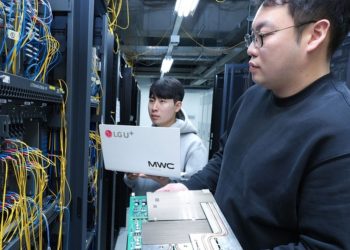South Korea’s tech sector has long been recognized for its advancements and strategic collaboration with international partners. The first quarter of 2024 especially witnessed a surge with a flurry of international collaborations. These strategic partnerships between South Korean companies and global tech giants are expected to play a pivotal role in driving advancements across various sectors.
From semiconductor manufacturing to artificial intelligence and electric vehicle technology, these collaborations demonstrate the convergence of expertise and resources aimed at pushing the boundaries of technological innovation.
This article offers a comprehensive overview of the key collaborations shaping the future of the South Korean tech industry and its global impact.
OpenAI Explores Semiconductor Collaboration in South Korea
![]()
OpenAI CEO Sam Altman recently delved into potential semiconductor partnerships with leading South Korean tech firms Samsung and SK Hynix. His visit, which occurred on January 26, 2024, aimed to assess opportunities for collaboration in chip production, particularly in light of the demand for computing power driven by AI applications like ChatGPT.
During his visit, Altman met with top executives from Samsung Electronics Co. and SK Hynix Inc., discussing potential ventures and exploring avenues for OpenAI’s entry into the semiconductor market. With this, OpenAI’s planned to diversify its chip supplier base and reduce dependency on Nvidia, its primary GPU provider for ChatGPT series.
TSMC and SK Hynix Forge AI Semiconductor Alliance
![]()
On February 8, 2024, SK Hynix and Taiwan’s TSMC came together to establish an “AI semiconductor alliance,” to collaborate in artificial intelligence (AI) technologies.
Under the alliance, SK Hynix, known for high-bandwidth memory (HBM), and TSMC, the world’s largest semiconductor foundry, aim to counter Samsung Electronics’ dominance in the sector.
This collaborative effort involves the development of the sixth generation of High Bandwidth Memory (HBM), named HBM4, and signifies a significant advancement in semiconductor technology. The partnership’s potential impact on the AI semiconductor landscape is highly anticipated, with industry experts acknowledging its pivotal role in driving technological advancements in the field.
Samsung, Vodafone, and AMD Collaborate on AMD-driven Open RAN Call

On February 14, 2024, Samsung Electronics, Vodafone, and AMD successfully completed an end-to-end call utilizing the latest AMD processors. This achievement marks the first instance of AMD processors enabling Open RAN technology, signaling a new era of innovation in the telecommunications sector.
The successful call, conducted within Samsung’s R&D facility in Korea, utilized Samsung’s vRAN software compliant with O-RAN standards and was powered by AMD EPYC 8004 Series processors running on Supermicro’s Telco/Edge servers.
The collaboration between Samsung, Vodafone, and AMD aims to empower operators in building and modernizing mobile networks with increased flexibility, faster time-to-market, and enhanced performance.
Additionally, the strategic partnership between Samsung and Vodafone seeks to modernize legacy networks and support the Open RAN ecosystem alongside industry leaders.
Samsung Joins Global AI-RAN Alliance to Pave the Way for 6G Technology

On February 27, 2024, Samsung Electronics, in collaboration with leading global tech firms such as Nvidia, Arm, and Microsoft, announced its participation in the AI-RAN Alliance at Mobile World Congress 2024 in Barcelona, Spain.
The formation of this alliance was a concerted effort to advance sixth-generation (6G) technology by integrating artificial intelligence (AI) with the Radio Access Network (RAN).
The AI-RAN Alliance, structured into three specialized subgroups—AI for RAN, AI and RAN, and AI on RAN—aims to propel the development of 6G networks by utilizing the collective expertise of industry leaders.
Through the optimization of wireless communication efficiency, resource management, and the development of innovative AI-driven applications, this collaboration seeks to set new standards in telecommunications technology.
Mark Zuckerberg Explores AI and XR Collaborations with LG and Samsung in South Korea

On February 28, 2024, Meta CEO Mark Zuckerberg made his first visit to South Korea in nearly a decade as part of his Asian tour. During his visit, Zuckerberg engaged in discussions with top executives from LG Electronics and Samsung Electronics, focusing on potential collaboration opportunities in artificial intelligence (AI) and extended reality (XR) technologies.
Zuckerberg’s meetings with LG Electronics CEO William Cho and Samsung Electronics Executive Chairman Lee Jae-yong in Seoul revolved around exploring avenues for enhanced cooperation in AI and XR technologies.
Discussions centered on the potential development of an advanced XR device, with LG hinting at a possible market entry by 2025 following collaborative efforts with Meta. Zuckerberg and Cho delved into potential collaboration in on-device AI technology, leveraging Meta’s innovative language model, signaling their shared interest in advancing XR technologies.
KT and AWS Forge Alliance to Enhance Generative AI and Mobile Solutions

On March 1, 2024, KT unveiled a strategic collaboration with Amazon Web Services (AWS) during the Mobile World Congress in Barcelona. This partnership aims to propel the development of generative AI and mobile services tailored for business clients, leveraging AWS’s cloud computing expertise alongside KT’s industry knowledge and infrastructure.
The collaboration between KT and AWS focuses on advancing generative AI capabilities and private 5G services, with a particular emphasis on Amazon Bedrock, AWS’s offering for creating generative AI services on its cloud platform.
Through this joint initiative, businesses can anticipate enhanced operational efficiency and innovation opportunities with the integration of generative AI solutions into their applications. Additionally, the partnership aims to deliver strong cloud-based private 5G networks, catering to the connectivity needs of corporate and public sector clients.
Ferrari Partners with SK On for EV Battery Advancements

Luxury carmaker Ferrari has announced a strategic collaboration with South Korea’s SK On to work on innovations in electric vehicle (EV) battery technology, as revealed on March 28, 2024. The partnership aims to leverage collective expertise to propel advancements in battery cell technology, with a memorandum of understanding already established between the two entities.
Under the leadership of Ferrari’s CEO, Benedetto Vigna, the company is making a strategic shift into the electric vehicle market. As part of this endeavor, Ferrari plans to introduce its first fully electric car by the fourth quarter of next year and is currently constructing a new EV factory in northern Italy. SK On, serving as Ferrari’s exclusive battery supplier since 2019, has played a pivotal role in powering Ferrari’s flagship electric vehicle models, including the SF90 and 296 GTB series, demonstrating a strong commitment to driving forward advancements in battery technology.
As we reflect on the international deals in South Korea’s tech industry in the first quarter of 2024, it becomes evident that collaboration lies at the heart of innovation. These partnerships embrace diversity, fostering cross-border cooperation and driving meaningful progress in various technological domains. The momentum generated by these collaborations will push further advancements in the global tech space.
Also Read:
- Coin Gate Fallout: South Korean Judges’ Crypto Holdings Exposed
- Luxury Carmaker Ferrari Joins Forces with SK On for EV Battery Innovation
- Hyundai Motor Group’s $51 Billion Investment: Accelerating Electric Vehicle Innovation
- LG Group’s $74 Billion Investment Drive: A 5-Year Blueprint for Future Innovation
- Samsung Secures $752 Million Contract with Naver for Mach-1 AI Accelerator Chips







